Right now, as you read this sentence, something extraordinary is happening. Light waves are hitting your retina, electrical signals are firing across billions of neurons, and somehow—through a process science cannot explain—you are experiencing the meaning of these words.
This is the mystery that has neuroscientists stumped. They can map every synapse, measure every brain wave, but they cannot bridge the gap between neural activity and the simple fact that it feels like something to be you right now.
For thousands of years, contemplatives across diverse traditions have approached this mystery from the inside. The Vedas, Upanishads, Tantraloka, and Shiva Sutras represent detailed investigations into the nature of Consciousness itself—not through external measurement, but through direct inquiry into immediate experience.
What they discovered challenges our most fundamental assumptions about Reality. While Western science treats Consciousness as matter's mysterious byproduct, these traditions reached conclusions that would revolutionize how we understand existence itself.
This isn't mere philosophy or belief. This investigation combines rigorous inquiry with direct exploration of your direct experience.
The question isn't whether Consciousness exists—you can't doubt that without proving it. The question is: what is Consciousness, really? And once you discover the answer, everything changes.
Below is your guide to this investigation.
Let's begin.
I. What is Consciousness?
Consciousness is the Awareness of experience. Right now, you are having an experience and are aware of it. This means that there is a difference between the content of experience (what is happening), experience itself, and the Awareness itself.
Therefore, we have a natural structure in which Awareness is primary. Here, Awareness is pure Awareness that can be aware of experience or no experience (e.g., deep sleep or nirvikalpa samadhi).
Next comes the experience of experience. You can think of this as a meta experience because it is like something to have ‘an experience.’
Finally comes the content of experience.
This includes everything in our experience, such as:
Subject: this is your Identity
Object: the world
Context: Overall situation
Events: what is happening
Relationship: the Relationship between the ‘I,’ the ‘World,’ and what is happening.
II. What Can We Know with Certainty?
Let’s start with a simple question: “What do we know with 100% certainty?”
Think about this: at this moment, you could be dreaming, immersed in the Matrix, or simply a brain within a box, receiving electric signals that shape your entire Reality. In other words, your whole experience can be a type of Simulation, and you would have no way of knowing.
Now, is there anything that remains?
Is there anything that you know with 100% certainty regardless of conditions?
Yes, just Consciousness.
Regardless of any condition, you're aware that experience is happening.
You are the Consciousness that is aware of both the world out there and even the identity in here. You are aware of both the subject and the object.
Therefore, Consciousness is the only thing we can be certain of.
ALL Knowing Happens in Consciousness
So, how do we know anything?
We know through our experience.
Everything you know—all the facts, all the science, all the empirical claims and observations, and even something as simple as 1+1=2—is known through your Consciousness.
In fact, we never come directly into contact with the world out there. Even the external, objective world is a phenomenon we experience in our Consciousness.
Can you know anything outside of your Consciousness?
Obviously NO.
Thus, all we know, or that anybody knows, or that can be known, happens in someone’s experience; it all comes back to Consciousness.
What we know for sure is that Consciousness is our actual lived Reality.
But is this just our Reality?
Are we Consciousness itself experiencing a physical reality, or are we physical beings having a conscious experience?
III. The Nature of Reality
What is the nature of Reality itself?
Few ever dare ask this question, but avoiding it does not let you sidestep the implication.
First, if you have never investigated this question deeply, you still have a set of Worldviews and hidden beliefs about the nature of Reality. Assumptions about what the world is are like a framework that appears to you as unquestionably true.
Second, you are a product of this world, so whatever is true for the greater Reality is also true for you and your loved ones.
Third, you act and behave in accordance with your beliefs and worldview.
Therefore, this question significantly impacts your perception and the way you live your entire life.
Let’s examine it.
There Can Only Be One Reality
First, there can only be one Reality.
There can only be ONE Reality; if multiple realities existed, then those other realities would also be real and thus part of a larger reality.
Reality is ONE.
The ONE Reality encompasses all changes and possibilities while remaining unchanged itself.
But what is it?
What is 'Reality'?
Ontologically, Reality is ‘what is.’
Reality is what exists.
Now, with existence, we have a sense of permanence.
The Absolute Reality is that it is the most permanent, unchanging, and unconditional.
Is there anything in our experience that is permanent, unchanging, and unconditional?
Yes, emptiness.
Emptiness and silence both possess the qualities of being changeless, formless, unconditional, and are ever present.
No matter what object comes in or what change may occur, the emptiness that holds it remains unchanged or unaltered.
Emptiness can hold any and all shapes and forms. It takes on all possibilities without being any one of them. It holds the entire known universe and lets it expand.
It’s everywhere; thus, Omni presents.
In these ways, the Absolute resembles emptiness because it can contain the relative, all distinctions, all qualities, all possibilities, and all infinities.
It transcends and includes all differences and duality.
It contains the totality, so time and space exist with it.
It simultaneously embodies both NOTHINGNESS and ALL INFINITIES.
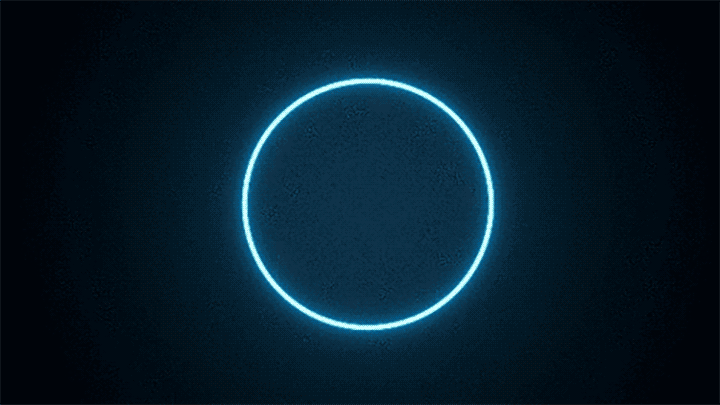
This may sound paradoxical, so consider this analogy:
Imagine Reality as 'X' in an algebraic equation.
X represents pure potential—not any specific number, but the capacity to be any number.
X contains infinite possibilities while being none of them in particular.
When X manifests as '2,' we experience the number 2 with all its specific qualities.
But like all manifestations, this experience arises and passes away.
Eventually, through this process, every possibility is known.
With our understanding that Reality is one and nondual, we can proceed to ask our most essential question:
What is Reality made of?
Is Reality made of Consciousness, or is it made of matter?
Sidenote on the Problem of Duality (Multiple Realities)
Some of you may wonder why we can’t have multiple realities or have Consciousness and matter as separate realities or aspects of each other. This would create a Duality.
The problem with duality is that it demands two fundamentally different realities—such as mind and body, or Consciousness and matter—not only exist side by side but also somehow interact. Yet, interaction requires a bridge —a shared medium or space where information can be exchanged. For communication to occur, each side must already participate in a common language of being, a shared reality. However, if they are fundamentally different, a shared space cannot exist. The very possibility of interaction cancels the claim of absolute difference.
If the two realities are utterly distinct, no bridge is possible, and communication collapses into impossibility.
If a bridge exists, then by definition, both realities share something in common—meaning they are not fundamentally different after all.
Thus, either dualism denies communication (and becomes incoherent, since we clearly experience mind–body interaction), or it admits communication (and collapses into a form of monism).
Duality tries to have it both ways: absolute difference and real interaction. But these two claims are mutually exclusive. Either the difference is absolute—in which case no interaction is possible—or interaction is real—in which case the difference cannot be absolute. There is no consistent way to maintain both.
IV. Materialism vs. Idealism
In philosophy, we face a fundamental choice: Reality is either consciousness-based or matter-based. It cannot be both without splitting Reality into two, thus creating an unsolvable duality.
Materialism asserts that matter is the fundamental nature of Reality. Everything emerges from matter and returns to it. For materialists, Consciousness is a byproduct of matter; it’s the result of brain activity.
And this is where Materialism runs into its first problem, the Hard Problem of Consciousness.
The Hard Problem of Consciousness
The Hard Problem of Consciousness arises from the precise observation that matter alone does not explain HOW and WHY Consciousness emerges at all.
Science can explain many “easy problems” of Consciousness: how the brain processes information, how we integrate sensory inputs, how attention works, and how we produce behavior.
But none of these explanations tell us why or how brain processes are accompanied by subjective experience—the inner “what it’s like” to see red, feel pain, or taste coffee.
Why It’s “Hard”
Physical explanations describe functions and mechanisms.
There is nothing about any physical property or quantity from which we can deduce the properties of experience.
Subjective experience (also called qualia) is not just a function—it has an irreducible, first-person quality.
The gap is that no amount of objective, third-person description seems to explain why it feels like to be conscious.
The hard problem suggests that explaining Consciousness may require more than standard physical science. Scientists are questioning whether subjective experience is a fundamental feature of Reality, not something reducible to brain mechanisms.
This dilemma poses a significant obstacle to Materialism, as it fails to explain how or why Consciousness arises from matter.
As a result, there is no evidence that matter has ontological priority.
Nevertheless, we owe it to ourselves to examine the entire picture and compare both models side by side.
Here, we will only focus on what we know with certainty.
Materialism / Physicalism
Requires Consciousness to cognize it and define it; thus, it is dependent on Consciousness.
Objects don’t have a reality of their own; their Reality is borrowed or defined through differences and distinctions. For example, ‘tall’ and ‘short’ define each other.
Constantly changing: Short is short until it meets shorter, then it becomes tall.
A is A because B is B
Dependent, conditional, subject to change
It exists in both time and space, making it non-absolute.
Challenge in explaining how spin, nuclear force, and gravity lead to the experience of falling in love, eating ice cream, and being in awe of a beautiful sunset.
There is no evidence independent of Consciousness: Anything we might call evidence is happening in Consciousness, defined by it, and subject to it.
Consciousness
100% real regardless of condition: Even if you're a brain in a box, in a simulation, or in a dream in the Matrix, irrespective of any condition, Consciousness exists with 100% certainty.
The only thing that MUST be Real is Consciousness.
Everything that is known is known through Consciousness.
Everything that is knowable can only be known in Consciousness.
Anything outside of Consciousness can never be confirmed, thus there can never be any evidence for it.
Consciousness is the only thing that is aware of Consciousness.
Consciousness is all-knowing; it knows itself and the world. It does not create a duality.
Given all of this information, we have gained clarity.
The material physical world depends on Consciousness, but Consciousness does not depend on matter.
Consciousness defines matter and makes it real through experience.
Consciousness is the only thing that knows both itself and the world; thus, there is no duality, contradiction, or Hard Problem.
Consciousness, the first model, solves our problems, and most importantly, it conforms to our actual experience.
Our primary Reality and all we know is Consciousness, so it would be no surprise that the fundamental nature of Reality is Consciousness itself.
This brings a few questions.
How does Consciousness create our world of experience?
If Consciousness is all there is, how does it create the objective world and then get lost in it?
As Consciousness, why aren’t we aware of this process?
You can explore Materialism vs Idealism further here
V. How Does Consciousness Create Experience?
If Consciousness is fundamental, how does it create our world of experience? How does it create the objective world and then get lost in it?
States of Consciousness
First, consider the different states you can experience:
You can be aware of emptiness (meditation, deep sleep)
You can witness experience as an observer
You can be fully absorbed in experience, forgetting you're having an experience (flow states)
This shows that there's a difference between Awareness itself and experience.
Consciousness is aware of experience.
Now, what is experience?
To experience something, Consciousness only needs to contract itself, focus, and imagine.
You can do it right now.
Close your eyes, envision a succulent orange, and your mouth will soon begin to salivate. You are having an experience.
Thus, Consciousness can create experiences using its imagination.
This ability explains the entire world of experience.
It can then project itself into this new Reality as the subject, experiencing a world, and it can make itself forget that this is the case.
But surely forgetting is impossible, right?
No.
We forget every night.
We fall asleep, and we enter the dream world, where nonsensical things happen. Despite the nonsense, we have totally forgotten about our real Reality and can’t recognize that we are in a dream. We wake up, and only then do we realize we were dreaming.
Thus, Consciousness can create worlds, experience them, and forget that it is doing so.
Experience Requires Limitation
To experience anything is to experience limitation. Even your dreams have a structure; they have a story, a world, characters, and so on. Within the context of your dream, things are coherent.
So, when you experience something, you are only conscious of a limited set of possibilities.
In this way, experience is the limitation; it is the contraction of Consciousness from all possibilities to a single experience.
Let’s look at a more specific example.
To experience a Football Game, we create a set of limitations and rules. We create a field, add a ball, a player, and an objective. All of these limitations allow us to experience the game of football.
Even while watching the game on TV, we can only watch one at a time.
If there were no limitations and we overlaid all games simultaneously, we would only see a black screen. The screen would become a dark void accompanied by white noise. It would be nonsensical.
So experience requires limitation, and experience is the experience of limitation.
We are all expressions of one Consciousness, which experiences itself by focusing on one of these sets of possibilities.
Other people are, in essence, a different modulation of the same Consciousness.
The Absolute Consciousness
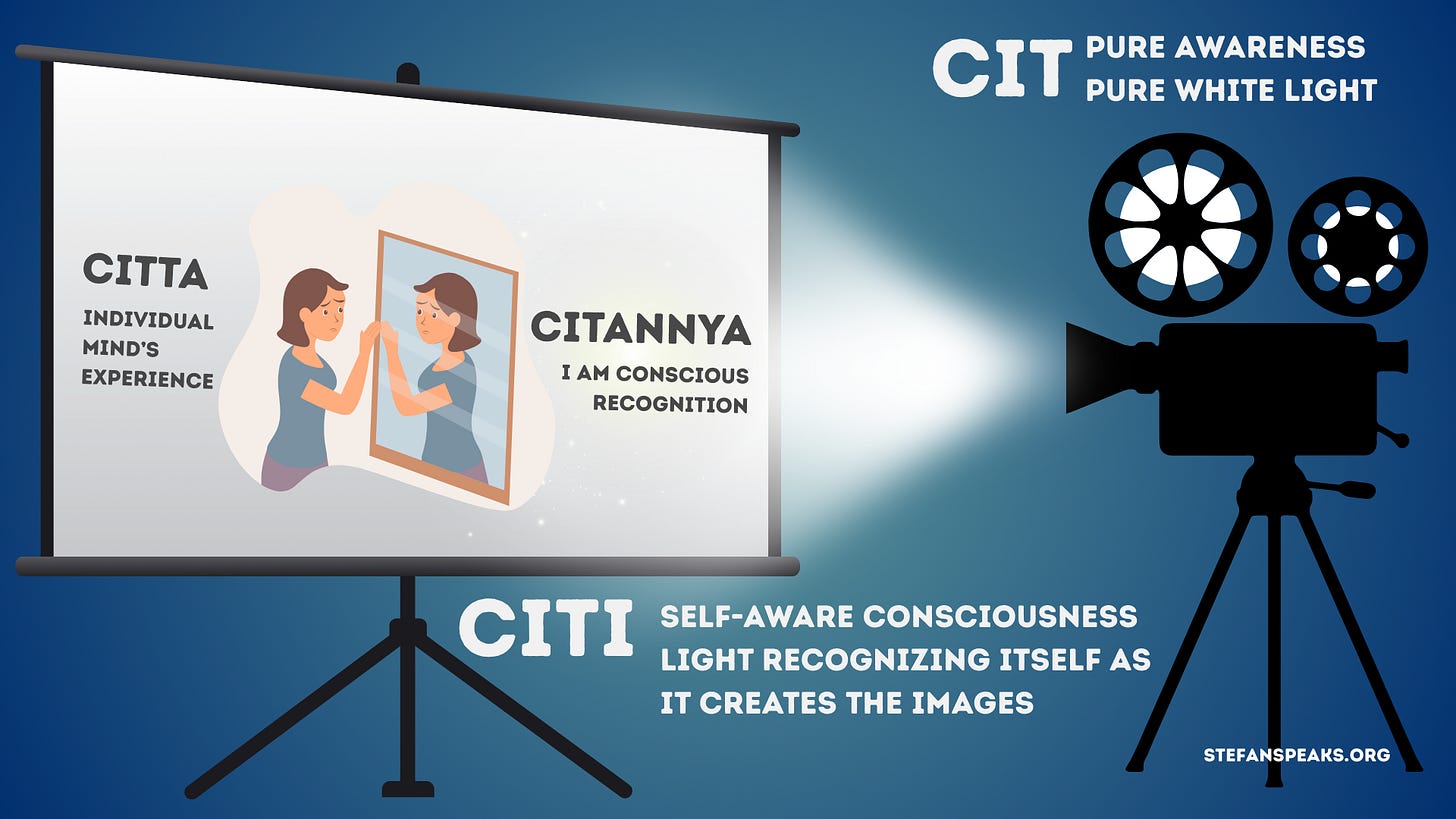
Reality at its most fundamental level is Cit—pure Awareness. This is the unchanging, all-pervading, and self-luminous principle that underlies all experience. It is the static foundation of Awareness, the primordial Reality that is ever-present Absolute.
But Consciousness is not merely passive. It is inherently self-illuminating and thus self-aware. This self-recognition transforms pure Awareness into Citi—dynamic, active Consciousness. Citi is the self-aware light that projects the world, the creative force that manifests the universe through its power of self-recognition.
The Absolute includes both these aspects of Consciousness. It contains all possibilities, and when a will to know emerges, attention focuses and conscious experience forms.
This is where Citta emerges—individual mind, Consciousness contracted into personal experience. Citta comprises intellect (buddhi), ego (ahamkara), and mind (manas). It is a limited reflection of Cit, subject to change and modification, yet still fundamentally the same Consciousness.
What we call being conscious—Citannya—is simply the quality of Consciousness as experienced from within this contracted state.
In this way, the Absolute is both the Alpha and Omega. It encompasses all that exists, could exist, and does not exist. When desire arises in this Absolute, it can take any shape, experience what it is like to be there, and then melt back into the Whole.
You can picture this as whirlpools in the Ocean. The whirlpools are not separate from the Ocean; they ARE the Ocean taking on specific shapes, having experiences within the Ocean, then melting back into the Ocean.
Each one of us, each embodied being, is a whirlpool in the Ocean—Cit appearing as Citi, creating the experience of Citta, while never ceasing to be the one Absolute Consciousness.
This understanding transforms how we see ourselves and Reality. We are not separate beings having conscious experiences—we are Consciousness itself, exploring its own infinite nature through apparent limitation and multiplicity.


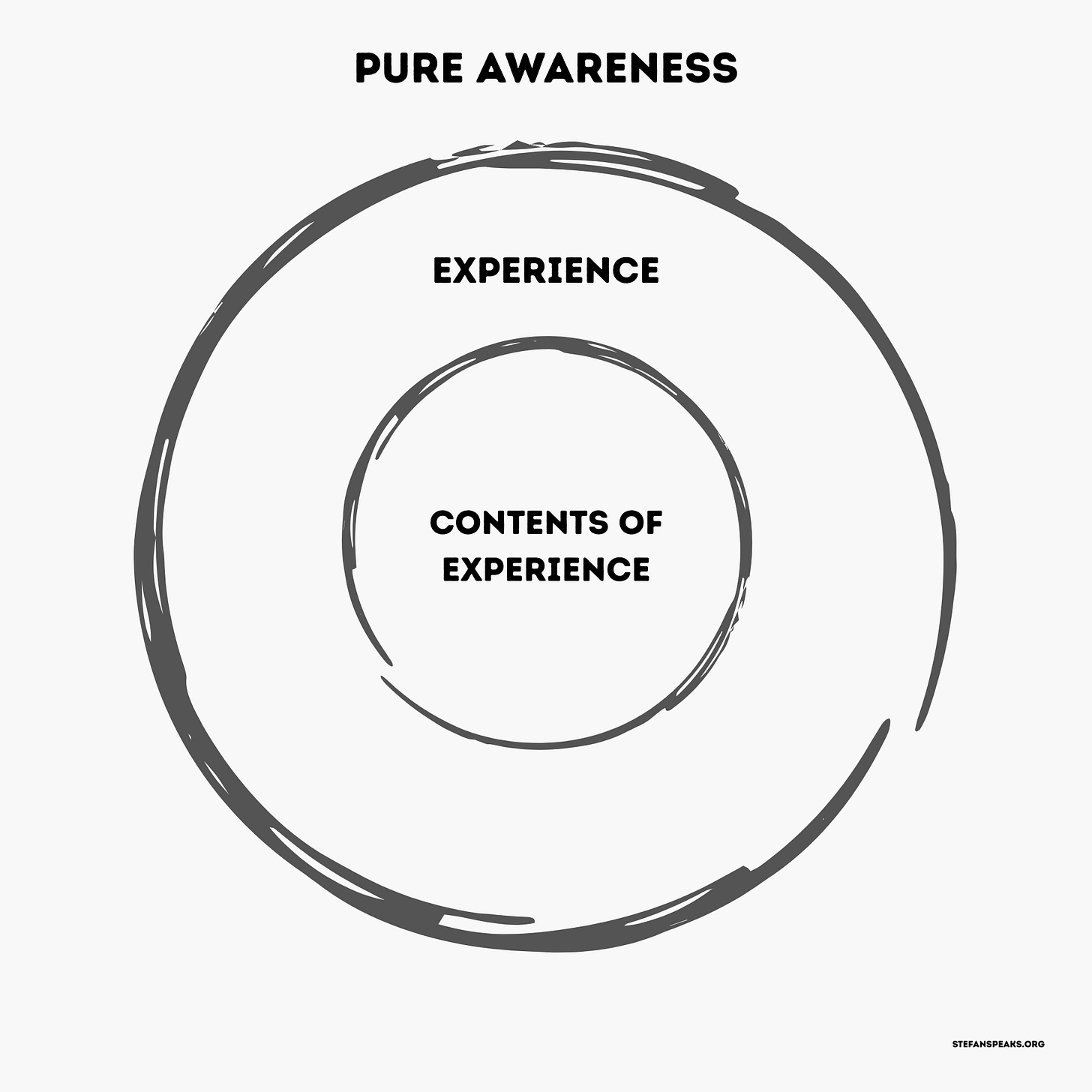
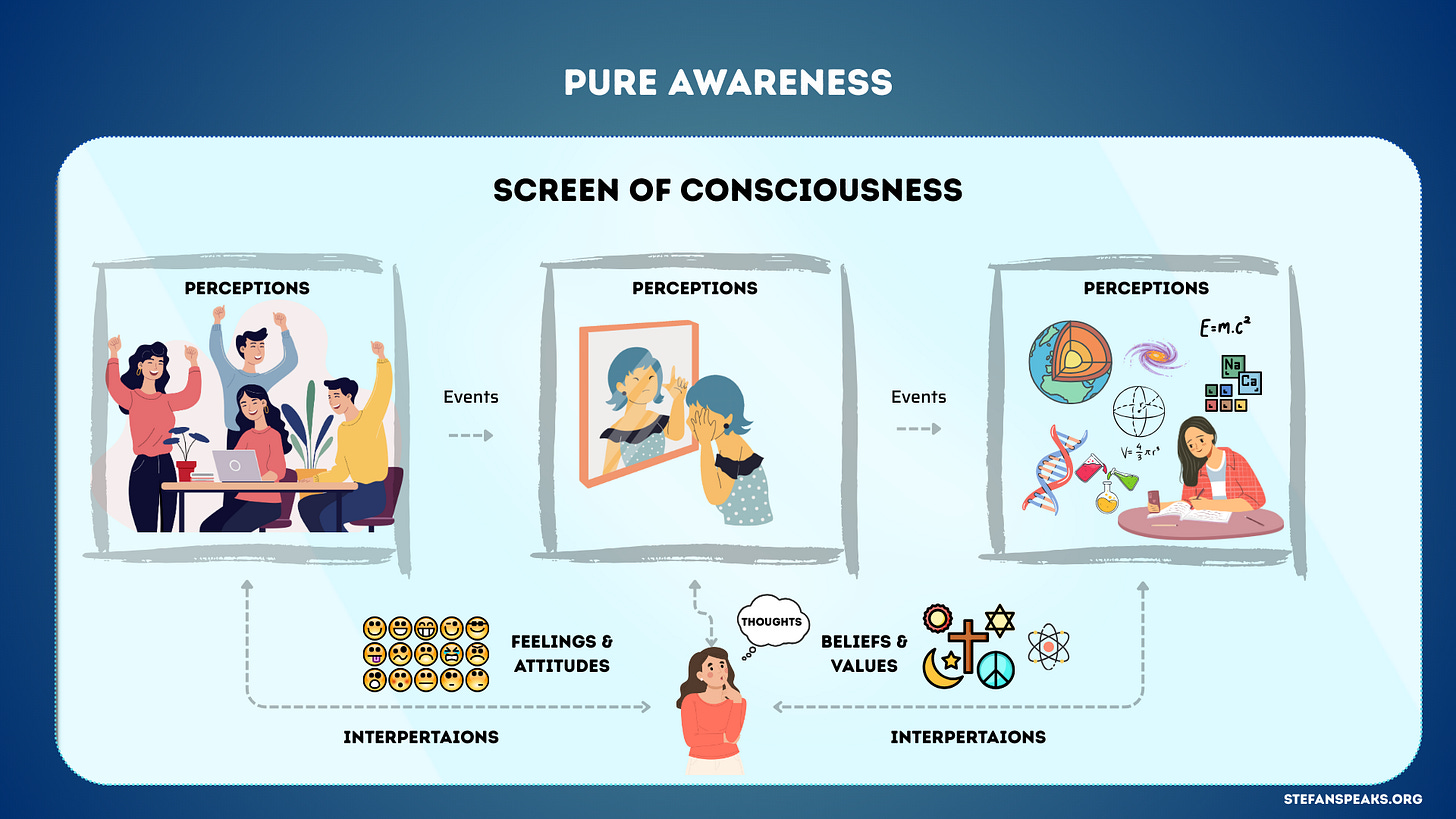

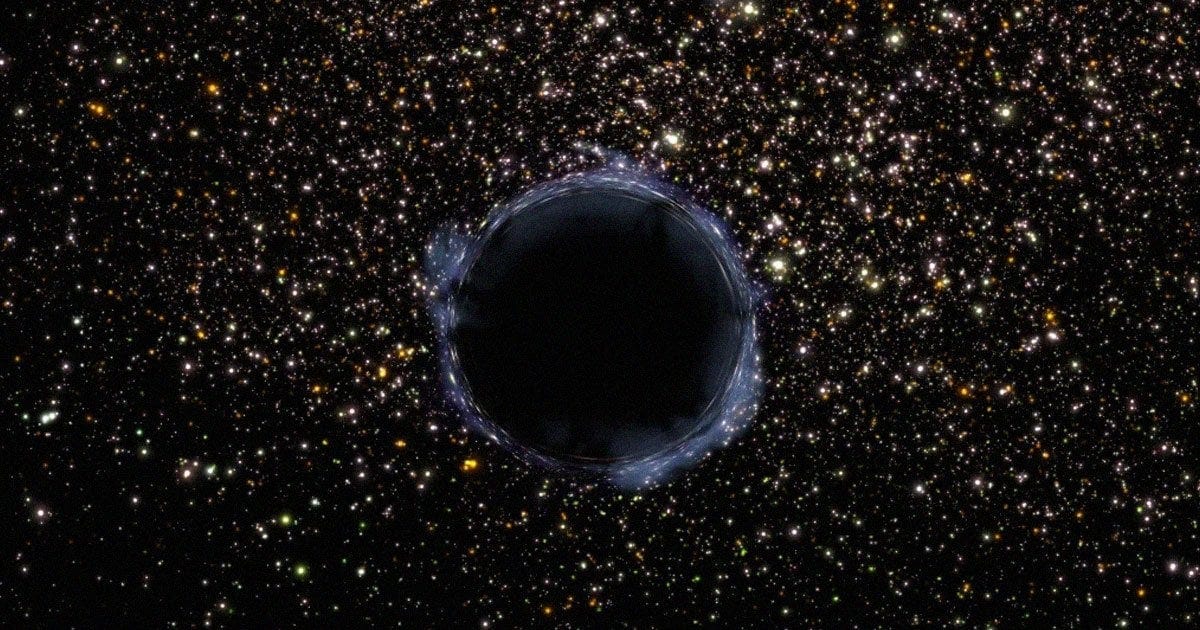
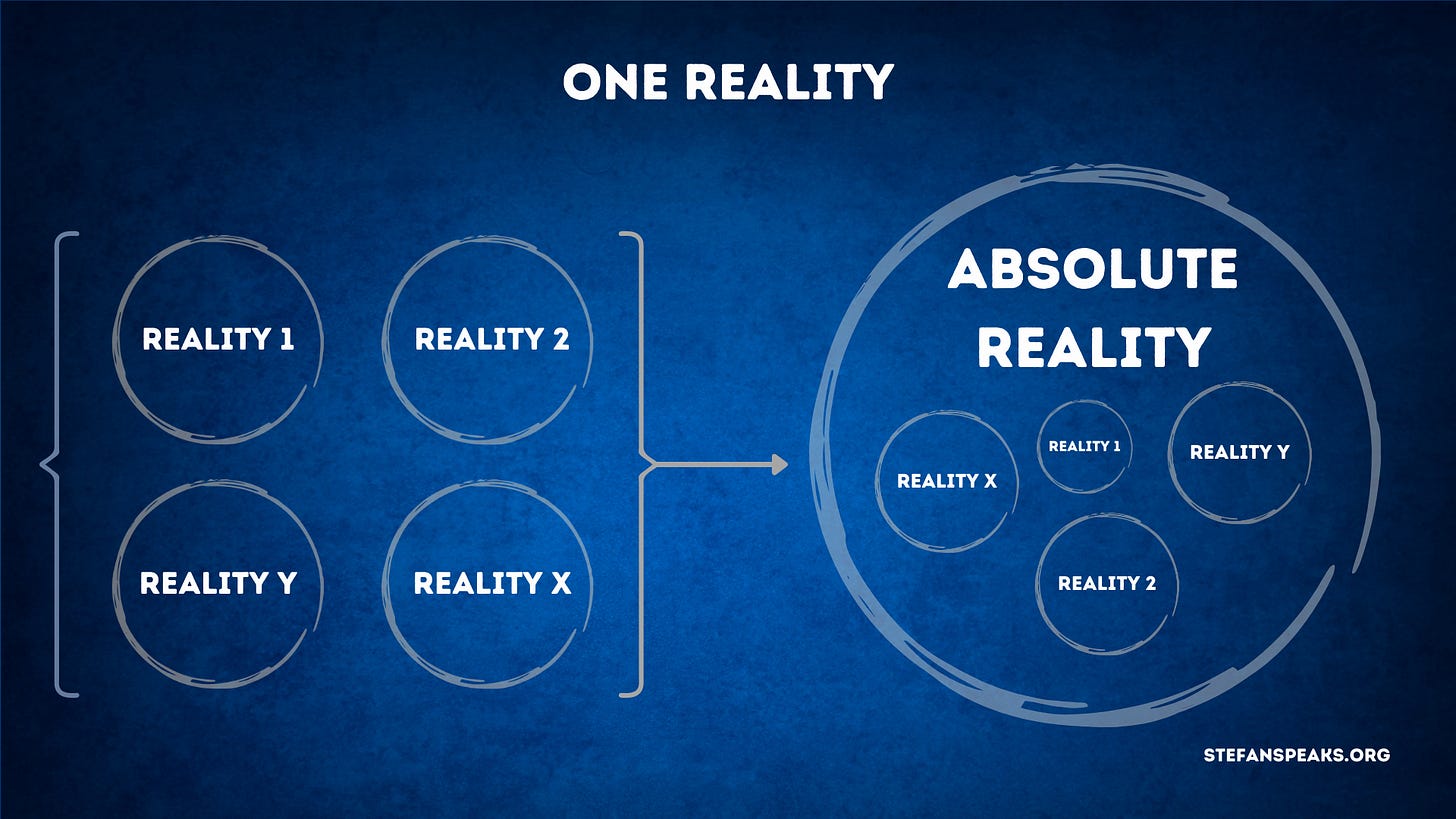
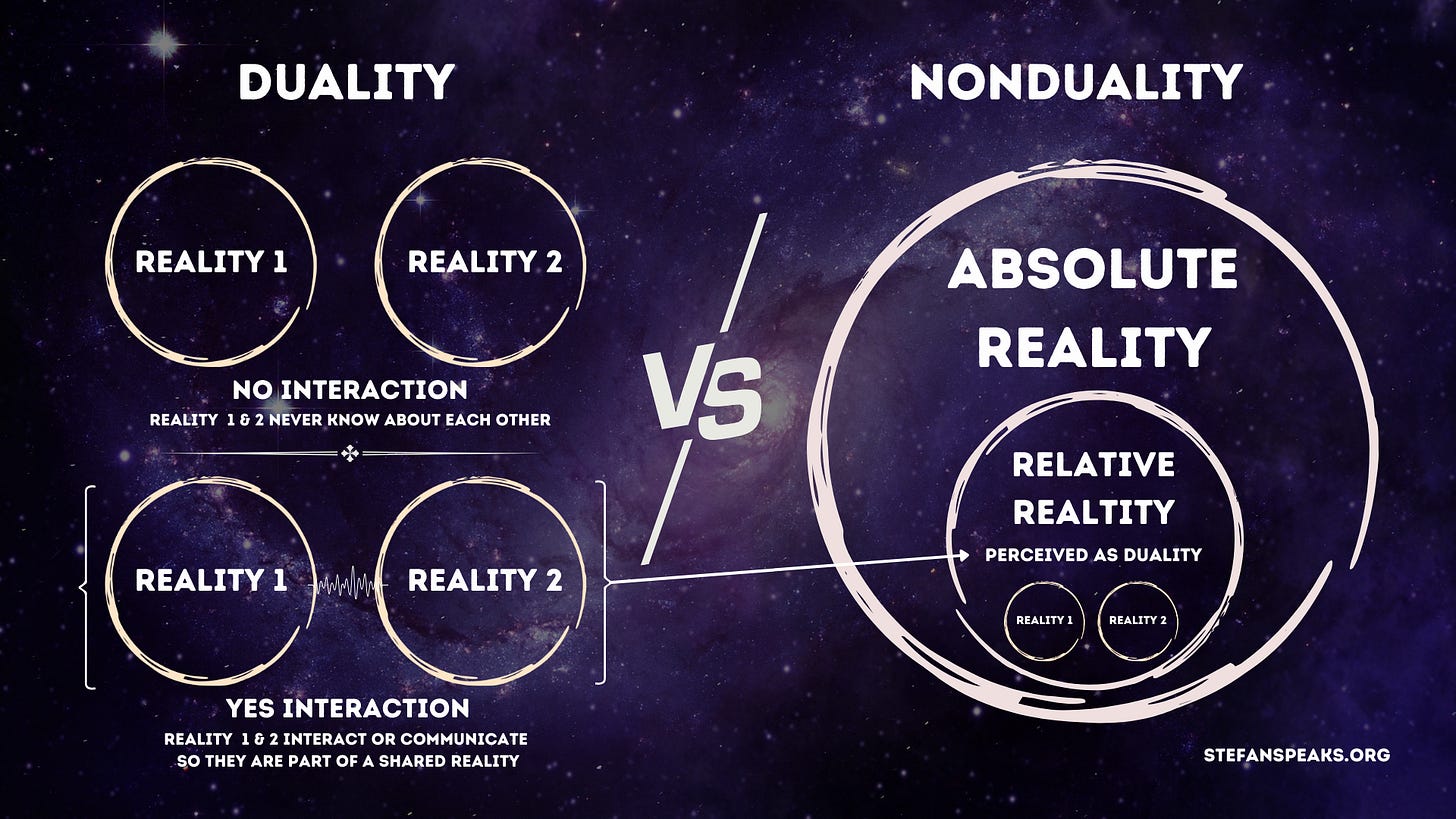
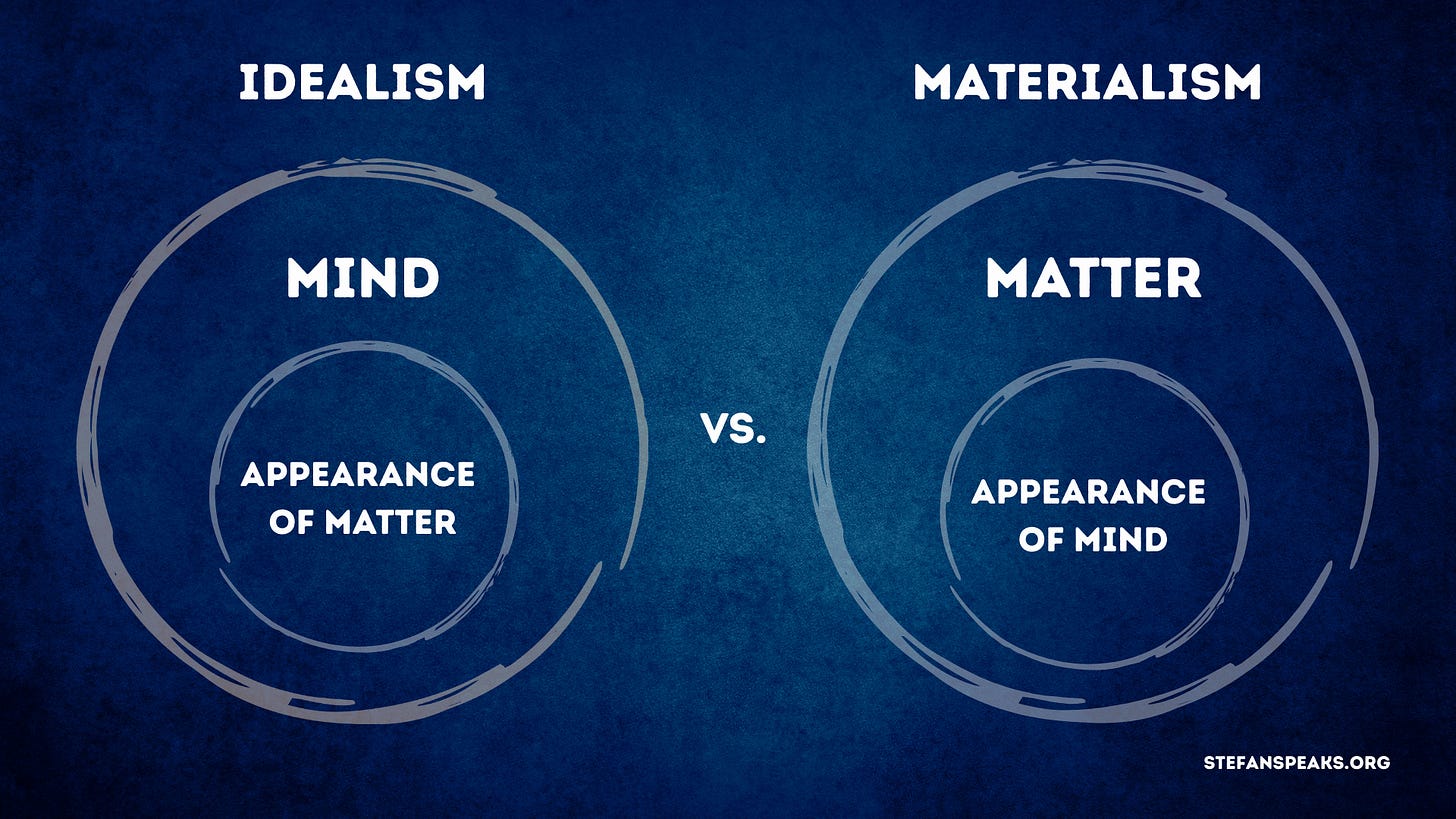
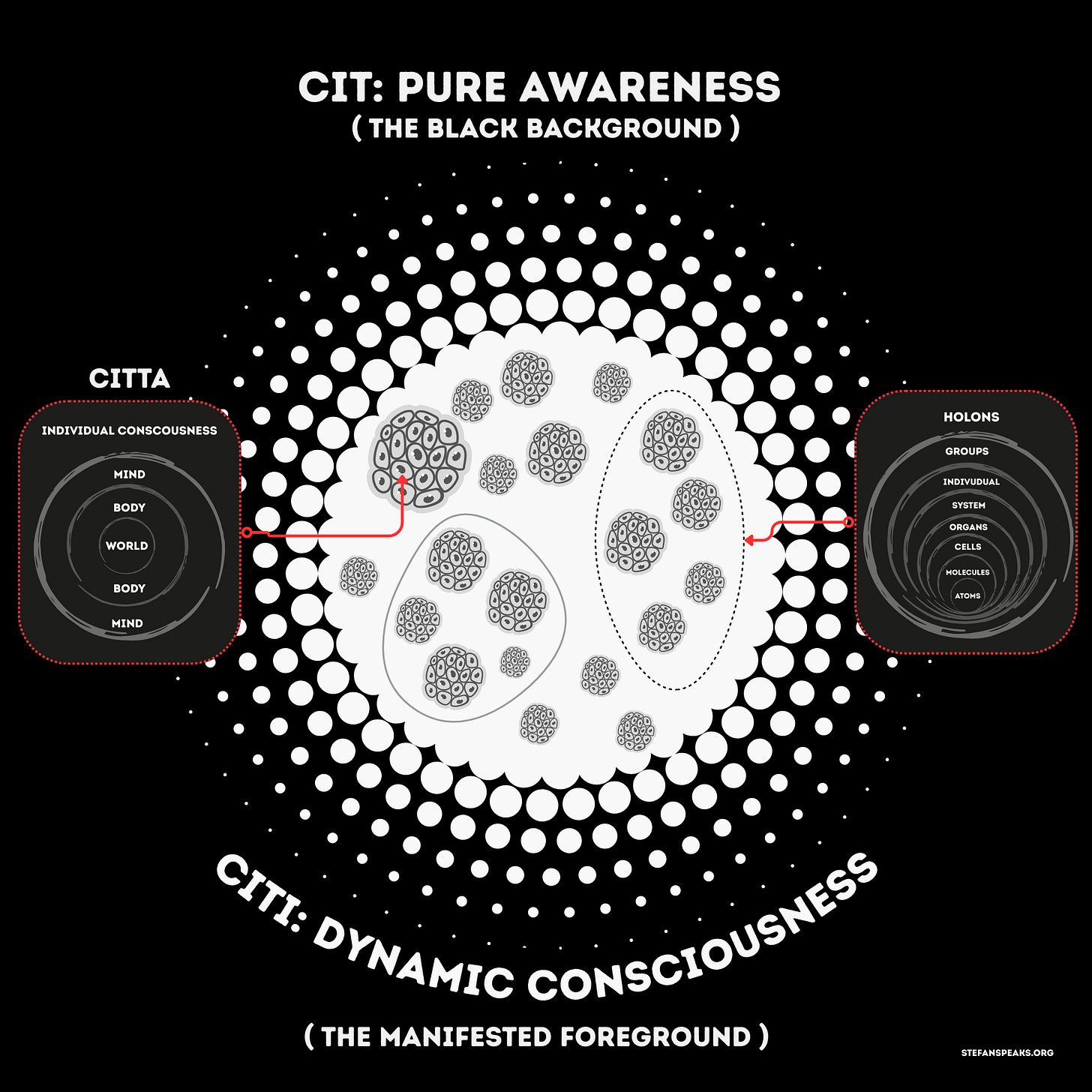
Simply putting a capital letter on a word does not, by itself, confer ontological dignity. Typography cannot do the work of metaphysics.
The difficulty with this essay is the abrupt pivot it makes. We begin with an apparently modest definition of consciousness as awareness of experience. But within a few sentences the author has slid, almost imperceptibly, into far bolder claims:
• “Consciousness is the only thing we can be certain of.”
• “Consciousness defines matter and makes it real through experience.”
Thus we move from the uncontroversial “consciousness = experience” to the rather more ambitious “Consciousness = the foundation of reality.” The manoeuvre is executed without fanfare, as though no leap had been made at all.
But it is a leap, and a non sequitur at that. The fact that all knowledge passes through consciousness (an epistemological observation) does not entail that consciousness constitutes the ground of being itself (an ontological claim). These are not two versions of the same thing, but two quite distinct orders of analysis.
To establish the ontological primacy of consciousness would require additional premises and arguments. As it stands, the argument relies less on reasoning than on typography: a capital letter here, a subtle semantic shift there. Rhetoric is doing the work that philosophy should be doing.
PS. Despite this critique, I share the author’s instinct that Consciousness may indeed carry ontological weight in relation to matter. To avoid endless equivocation, however, one might adopt a simple convention: consciousness (small c) for immediate experience, and Consciousness (capital C) for ontology. A typographical device, yes—but one that, if explicitly defined, could at least provide a minimal taxonomy and prevent rhetoric from masquerading as argument.